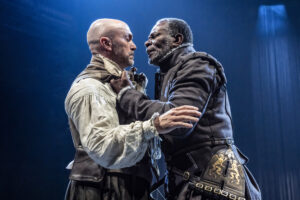Jessica Harris watches the Royal Shakespeare Company come close.
What is striking about the RSC’s new production of Othello is how restrained it feels. A departure from so many of the RSC’s productions over the past few years, beautiful Jacobean costuming and a move away from cross-casting lend a traditional quality to Tim Carroll’s production. But it is the muted performances by some key characters, rather than the world created by its staging choices, which leads to a sense of understatement.
John Douglas Thompson excels as Othello, his character evolving before our eyes. At the peak of his career in the Venetian army, Othello is heroic and virtuous. His open nature helps him rise above the racial slurs of others, including Iago, his ensign, and Desdemona’s father who objects to their marriage. He is also deeply in love and unafraid to show his passion openly.
As Iago plants seeds of suspicion about Desdemona’s fidelity, so Thompson’s physical performance shifts. Wracked by anguish and hobbling around the stage, Othello’s jealousy becomes all-consuming, and we see that his passion is now a force that would kill that which he still loves.

In contrast, Will Keen’s performance as Iago is almost a closed book. Whilst his quietly-stated delivery provides a foil to Thompson’s vitality, it lacks a real sense of venom. His running of phrases together, and his placing of stress in unexpected places, detract from the signalling needed to keep the audience engaged with his motives. As Iago’s scheming to bring about Othello’s downfall reaches its climax, there is little change of tone or tempo, and dramatic effect is lost.
Meanwhile, Juliet Rylance’s Desdemona feels overly compliant and placid. Whilst her virtue is her prize, a little more fire in her performance would help persuade us of her love for Othello, and convince us that she truly wishes to live, when he threatens to kill her.
The production is lifted by some moments that are rich in dramatic tension, Othello’s presence on stage being the linchpin to these. His inability to see through Iago’s deceptions or to recognise Desdemona’s loyalty also provide moments of apprehension and suspense.
The preparation of Desdemona for her final night by Emilia and her attendant is a touching scene which alters the mood and focus, whilst the minimal set of a gauze curtain is used well to frame the deep love and friendship between Desdemona and Emilia.
By contrast, whilst the choice not to show violence against women on stage is understandable, the lengthy sound effects used in the blackout to signify Othello’s strangling of Desdemona are heavy-handed.
The production is also animated by some of the smaller parts. Jethro Skinner plays Rodrigo for the shallow fool that he is. Anastasia Hille as Emilia reminds us that women can be strong, as she counsels Othello on his wife’s virtuous nature, and confronts her husband, Iago, with the truth of what he has done. It is just a shame that her quiet voice is difficult to hear at times.
Music does much to signify menace and impending doom. Unaccompanied acapella pieces have an
Eastern European feel and, whilst being sombre, are beautifully sung.
Whilst effective in parts, this is a production which has not reached its potential, and the final impression is of a tragedy that has not fully been explored.
Othello was directed by Tim Carroll. Set and costumes were designed by Judith Bowden, and music was composed by James Oxley.
It’s at the RSC in Stratford until 23rd November. For further information visit rsc.org.uk.
Pics: Johan Persson (c) RSC


